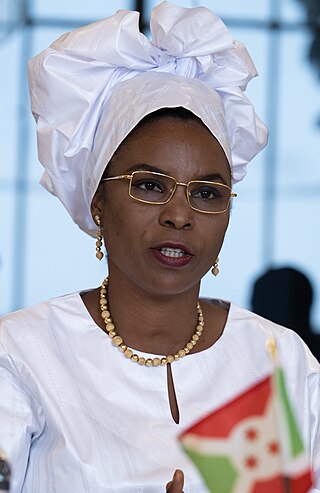
The Politics of Burundi takes place in a framework of a transitional presidential representative democratic republic, whereby the President of Burundi is both head of state and head of government, and of a multi-party system. Executive power is exercised by the government. Legislative power is vested in both the government and the two chambers of parliament, the Senate and the National Assembly.

Burundi originated in the 16th century as a small kingdom in the African Great Lakes region. After European contact, it was united with the Kingdom of Rwanda, becoming the colony of Ruanda-Urundi - first colonised by Germany and then by Belgium. The colony gained independence in 1962, and split once again into Rwanda and Burundi. It is one of the few countries in Africa to be a direct territorial continuation of a pre-colonial era African state.

The Burundian Civil War was a civil war in Burundi lasting from 1993 to 2005. The civil war was the result of longstanding ethnic divisions between the Hutu and the Tutsi ethnic groups. The conflict began following the first multi-party elections in the country since its independence from Belgium in 1962, and is seen as formally ending with the swearing-in of President Pierre Nkurunziza in August 2005. Children were widely used by both sides in the war. The estimated death toll stands at 300,000.

The National Council for the Defense of Democracy – Forces for the Defense of Democracy is the major political party in Burundi. During the Burundian Civil War, the CNDD–FDD was the most significant rebel group active and became a major political party in Burundi. The party's rule has been described as authoritarian.

Pierre Nkurunziza was a Burundian politician who served as the ninth president of Burundi for almost 15 years from August 2005 until his death in June 2020.
Alice Nzomukunda is a Burundian politician and former Second Vice-President of the country, from 29 August 2005 to 5 September 2006. She is an ethnic Hutu and was a member of the National Council for the Defense of Democracy-Forces for the Defense of Democracy (CNDD-FDD).

The Union for Peace and Democracy–Zigamibanga, sometimes known as the Union for Peace and Development–Zigamibanga, is a small political party in Burundi which was founded in 2002 but which only became active after 2007. The UPD is one of the parties in opposition to the ruling National Council for the Defense of Democracy – Forces for the Defense of Democracy (CNDD–FDD) party. It is seen as the party of Burundi's small Muslim community.

The National Liberation Front is an ethnically Hutu political party in Burundi that was formerly active as militant rebel group before and during the Burundian Civil War.
Marina Barampama is a Burundian politician. She was elected Second Vice President on 8 September 2006, replacing Alice Nzomukunda. She remained in post for six months, until she was sacked for her support of Hussein Radjabu. Formerly a member of the National Council for the Defense of Democracy-Forces for the Defense of Democracy (CNDD–FDD), she is now General Secretary of the Union for Peace and Development.
Nkurunziza is a Bantu surname which means "good news". It may refer to:
Pascal Nyabenda is a Burundian politician, who serves as President of the National Assembly of Burundi since 2015. He has been president of the ruling National Council for the Defense of Democracy – Forces for the Defense of Democracy since March 2012 and previously served as Governor of Bubanza Province.

Presidential elections were held in Burundi on 21 July 2015. President Pierre Nkurunziza ran for a third term despite controversy over whether he was eligible to run again. The opposition boycotted the vote, and Nkurunziza won re-election.
Hafsa Mossi was a Burundian politician, journalist, and member of President Pierre Nkurunziza's ruling CNDD–FDD political party. Mossi served as Minister of Information, Communications and Government Spokesperson from 2005 to 2007, as well as Minister of Regional Integration from 2009 to 2011, in Nkurunziza's Council of Ministers. She then served as a member of the East African Legislative Assembly (EALA), representing Burundi, from 12 June 2012, until her murder on 13 July 2016. Her current term in the EALA would have expired in 2017.

General elections were held in Burundi on 20 May 2020 to elect both the president and the National Assembly. Évariste Ndayishimiye of the ruling CNDD–FDD was elected president with 71% of the vote. In the National Assembly elections, the CNDD–FDD won 72 of the 100 elected seats.

General Évariste Ndayishimiye is a Burundian politician who has served as the tenth President of Burundi since 18 June 2020. He became involved in the rebel National Council for the Defense of Democracy – Forces for the Defense of Democracy during the Burundian Civil War and rose up the ranks of its militia. At the end of the conflict, he entered the Burundian Army and held a number of political offices under the auspices of President Pierre Nkurunziza. Nkurunziza endorsed Ndayishimiye as his successor ahead of the 2020 elections which he won with a large majority.
Victoire Ndikumana is a Burundian politician for the UPRONA party. She was Minister of Women's Advancement and Social Protection from 1991 to 1993, and Minister of Trade, Industry, Posts and Tourism from 2010 to 2014.
Léonard Nyangoma is a Burundian politician and former rebel leader.
Révérien Ndikuriyo is a Burundian politician, currently serving as secretary-general of the National Council for the Defense of Democracy – Forces for the Defense of Democracy (CNDD–FDD), a position he has held since 2021. From 2015 to 2020, he served as president of the Senate. He has also served as president of the Football Federation of Burundi since 2013.

Angeline Ndayishimiye Ndayubaha became the First Lady of Burundi in 2020. In 2023 she was given the United Nations Population Award.










